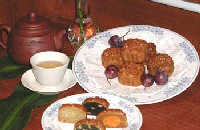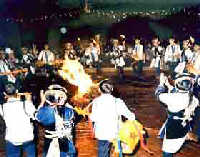 One day, Zhu's military counselor, Liu Bowen, came upon an idea, and ordered his subordinates to hide paperslips with "Uprising on August 15" on them in moon cakes. Then, the moon cakes were distributed among insurrectionary armies in different places, asking them to support the uprising on the night of August 15. When the day came, all insurrectionary armies converged to participate in the uprising. Soon, Dadu (Beijing), capital of the Yuan Dynasty, was captured.
One day, Zhu's military counselor, Liu Bowen, came upon an idea, and ordered his subordinates to hide paperslips with "Uprising on August 15" on them in moon cakes. Then, the moon cakes were distributed among insurrectionary armies in different places, asking them to support the uprising on the night of August 15. When the day came, all insurrectionary armies converged to participate in the uprising. Soon, Dadu (Beijing), capital of the Yuan Dynasty, was captured.
When news came of the successful uprising, Zhu Yuanzhang was so delighted that he allowed his men to celebrate the upcoming Mid-Autumn Festival with the common people and ordered the moon cakes used for hiding the paper slips to be distributed among the folks. Since then, the moon cakes have been made in a more and more exquisite way, with more varieties, and the custom of eating moon cakes continues to this day.
 Customs
Customs
 The main activities on the Mid-Autumn Festival are appreciating the full moon and eating moon cakes as mentioned in the origin of the Mid-Autumn Festival. Since China is a big country with a large population, the festival tends to be celebrated in various ways, with each way having its own strong local flavor.
The main activities on the Mid-Autumn Festival are appreciating the full moon and eating moon cakes as mentioned in the origin of the Mid-Autumn Festival. Since China is a big country with a large population, the festival tends to be celebrated in various ways, with each way having its own strong local flavor.
In Fucheng County of East China's Fujian Province, when the Mid-Autumn Festival began, the local women will cross the Nanpu Bridge in an attempt to seek longevity. In Jiannin County, lanterns are hung as a gesture to pray for pregnancy from the Moon. When people in Longyan County eat moon cakes, they often scratch a hole in the center of a moon cake for the elderly, signifying the withholding of secrets from the younger generations.
The custom of worshipping the moon on the Mid-Autumn day also prevails in the Chaozhou and Shantou regions of South China's Guangdong Province, mainly for women and children, as a proverb goes, "Men will not worship the full moon, nor will women worship the kitchen range." As night falls and the moon rises, the women will lay a table in the courtyard, with burning incenses and sacrifices, such as fruits and cakes, on it, to worship the moon in the sky. There is also the custom of eating taros on the festival, as August is the time for harvesting taros.
In the South of the Yangtze River, the Mid-Autumn customs also boast large varieties. Apart from moon cakes, a Guihua Duck, a famous local dish, will surely be served on the dining table that night. Besides, there are interesting names for different Mid-Autumn activities, such as: "Qing Tuan Yuan" (celebrating reunion), referring to families appreciating the full moon together; drinking together; "Yuan Yue" (worshipping the moon); and "Zou Yue" (walking the moon), which refers to going out together.
